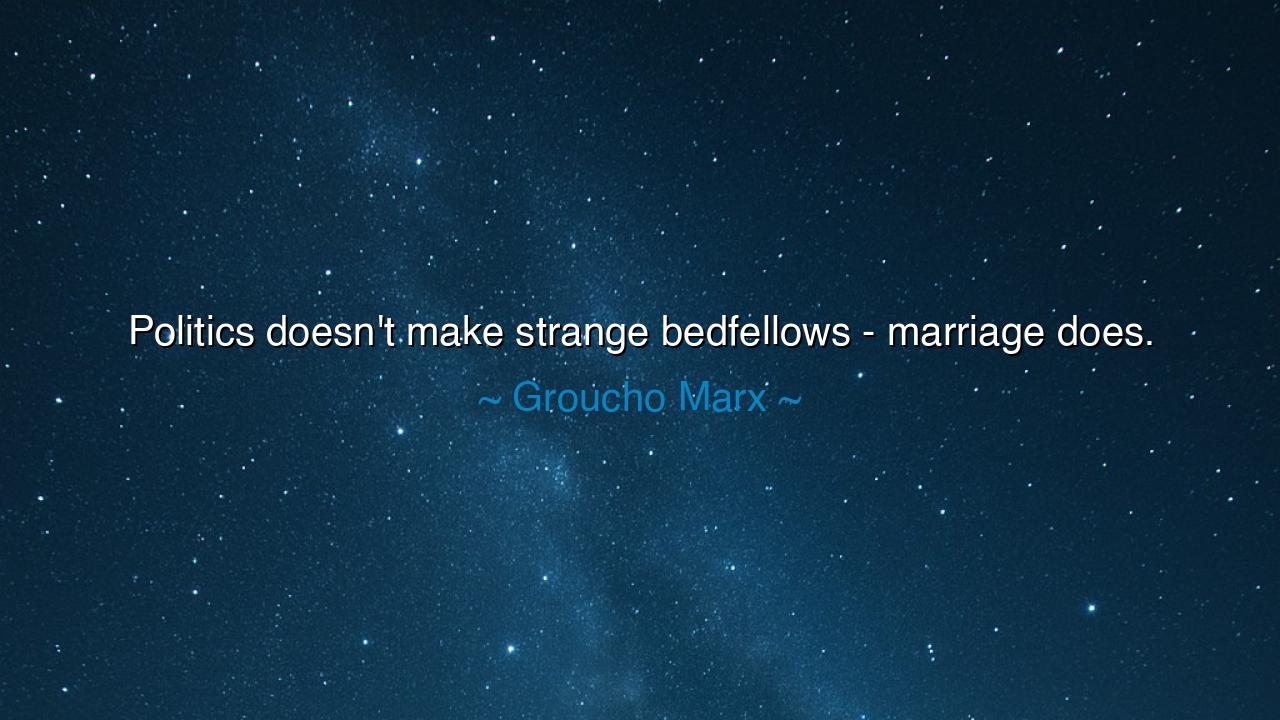
Politics doesn't make strange bedfellows - marriage does.






“Politics doesn’t make strange bedfellows — marriage does.” These words of Groucho Marx, the legendary comedian and master of satire, ripple with humor, yet hide beneath their laughter a profound truth about the human condition. With his typical wit, Marx uses a jest to illuminate the complexity of marriage — that sacred, tumultuous, and eternally fascinating bond between two souls. While politicians may form alliances of convenience, he suggests that nothing rivals the unlikely pairings and paradoxes that exist within the walls of matrimony. His humor is sharp, but it is not cruel. It is the laughter of one who sees through illusion, one who understands that love and absurdity often share the same house.
When Groucho speaks of “strange bedfellows,” he draws on an old saying used to describe the odd alliances that emerge in politics — enemies who unite for power, rivals who suddenly share a common goal. Yet, with a stroke of comic genius, he turns that saying inward upon the domestic sphere. In marriage, he observes, it is not only ideas or interests that clash, but personalities, habits, and dreams. A man and woman, drawn together by love’s fire, soon find themselves navigating differences so vast they might well belong to opposing kingdoms. One loves silence, the other song. One craves order, the other chaos. And yet, they remain bound — not by strategy, but by choice, by promise, by the inexplicable magnetism that defies logic. Thus, in marriage, as in life, we find the strangest of companions: not enemies, but lovers learning to coexist with each other’s beautiful madness.
The origin of Groucho’s humor lies in his genius for exposing the contradictions of human nature. Living through the early twentieth century — an age of upheaval, glamour, and uncertainty — he wielded comedy as a philosopher wields paradox. In this quip, he is not mocking marriage, but reminding us that it is an arena where opposites collide more fiercely than in any parliament. Politics is temporary; marriage is daily. Politics unites interests; marriage unites souls. And in that union, the strangeness of love is revealed: that two utterly distinct beings can live side by side, quarrel, reconcile, and still call it happiness.
Consider the story of Abigail and John Adams, one of history’s most remarkable marriages. He, the fiery statesman of the American Revolution; she, the steady hand, wise counselor, and moral compass of their household. Through decades of separation, hardship, and political storms, their letters reveal not only devotion but tension — the friction of two strong wills learning to move in rhythm. They did not always agree; their tempers clashed, their philosophies diverged. Yet through their differences, they forged one of the most enduring partnerships of their time. They were, in Groucho’s sense, “strange bedfellows” — opposites made whole through patience, respect, and humor. Their marriage, like many great ones, was not a sanctuary from life’s contradictions, but a training ground for understanding them.
Groucho’s laughter, though light, carries a whisper of wisdom: that strangeness is not the enemy of love, but its teacher. In politics, strange bedfellows unite for gain; in marriage, they remain together for growth. It is the very tension between difference and devotion that refines character, turning impatience into compassion and pride into humility. To love another truly is to embrace mystery — to find beauty not only in what is familiar, but in what is alien. In this way, the comedy of marriage becomes divine: two imperfect beings learning, through the absurdity of coexistence, the art of forgiveness.
Yet, Groucho’s words also warn us not to romanticize union beyond recognition. Marriage, he suggests with a grin, can bring together the most unlikely of souls — sometimes harmoniously, sometimes disastrously. It is not the solemn institution we imagine, but a living, breathing negotiation of the heart. Those who enter it expecting perfection will find only irony; those who enter it with humor will find survival. Laughter, as Groucho knew, is not the enemy of love, but its salvation. For when two people can laugh at their differences instead of resenting them, they transform strangeness into strength.
So let this be the lesson, my children, drawn from the wit of Groucho Marx: Do not fear the strangeness of love, nor the paradoxes of marriage. Every great union is a meeting of opposites — a dance of fire and water, will and surrender, reason and madness. The secret is not to seek sameness, but to cherish difference; not to flee discomfort, but to grow from it. Enter love not as conqueror or savior, but as fellow traveler on a road where laughter lights the way. For in the end, the strangest of bedfellows may yet build the truest of homes — not by perfect harmony, but by shared courage, shared humor, and the quiet grace of two souls learning, day by day, to belong to one another.






AAdministratorAdministrator
Welcome, honored guests. Please leave a comment, we will respond soon